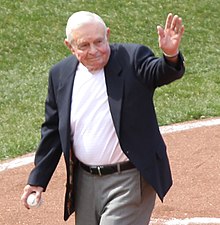Earl Weaver
| Earl Weaver | |||
|---|---|---|---|

Weaver in 2011.
|
|||
| Manager | |||
|
Born: August 14, 1930 St. Louis, Missouri |
|||
|
Died: January 19, 2013 (aged 82) Aboard Celebrity Silhouette, Caribbean |
|||
|
|||
| MLB debut | |||
| July 7, 1968, for the Baltimore Orioles | |||
| Last MLB appearance | |||
| October 5, 1986, for the Baltimore Orioles | |||
| MLB statistics | |||
| Games | 2,540 | ||
| Win–loss record | 1,480–1,060 | ||
| Winning % | .583 | ||
| Teams | |||
|
|||
| Career highlights and awards | |||
|
|||
| Member of the National | |||
|
|
|||
| Inducted | 1996 | ||
| Vote | Veterans' Committee | ||
Earl Sidney Weaver (August 14, 1930 – January 19, 2013) was an American professional baseball player, Hall of Fame Major League manager, author, and television broadcaster. After playing in minor league baseball, he retired without playing in Major League Baseball (MLB). He became a minor league manager, and then managed in MLB for 17 years with the Baltimore Orioles (1968–82; 1985–86). Weaver's style of managing was summed up in the quote: "pitching, defense, and the three-run homer." He did not believe in placing emphasis on "small ball" tactics such as stolen bases, hit and run plays, or sacrifice bunts. He was inducted into the Baseball Hall of Fame in 1996.
He was the son of Earl Milton Weaver, a dry cleaner who cleaned the uniforms of the St. Louis Cardinals and Browns, and Ethel Genieve Wakefield. After playing for Beaumont High School in his hometown, St. Louis, Missouri, the 17-year-old Weaver was signed by the St. Louis Cardinals in 1948 as a second baseman. A slick fielder but never much of a hitter, he worked his way up to the Texas League Houston Buffaloes (two steps below the majors) in 1951, but never made the Major League club. Weaver was later traded to the Pittsburgh Pirates organization, then moved on to the Orioles, where he began his managing career.
Hall of Fame pitcher Jim Palmer, who battled with his manager on a regular basis, once noted: "The only thing that Earl knows about a curve ball is he couldn't hit it." After Palmer's skills began to decline and he was no longer a regular starter, Weaver defended his actions by claiming he'd given Palmer "more chances than my ex-wife." He has also directed such a remark at Mike Cuellar, ace of the 1969 staff, and several other players.
...
Wikipedia
